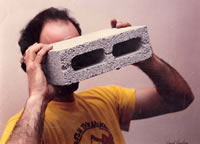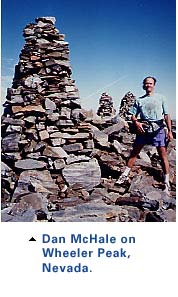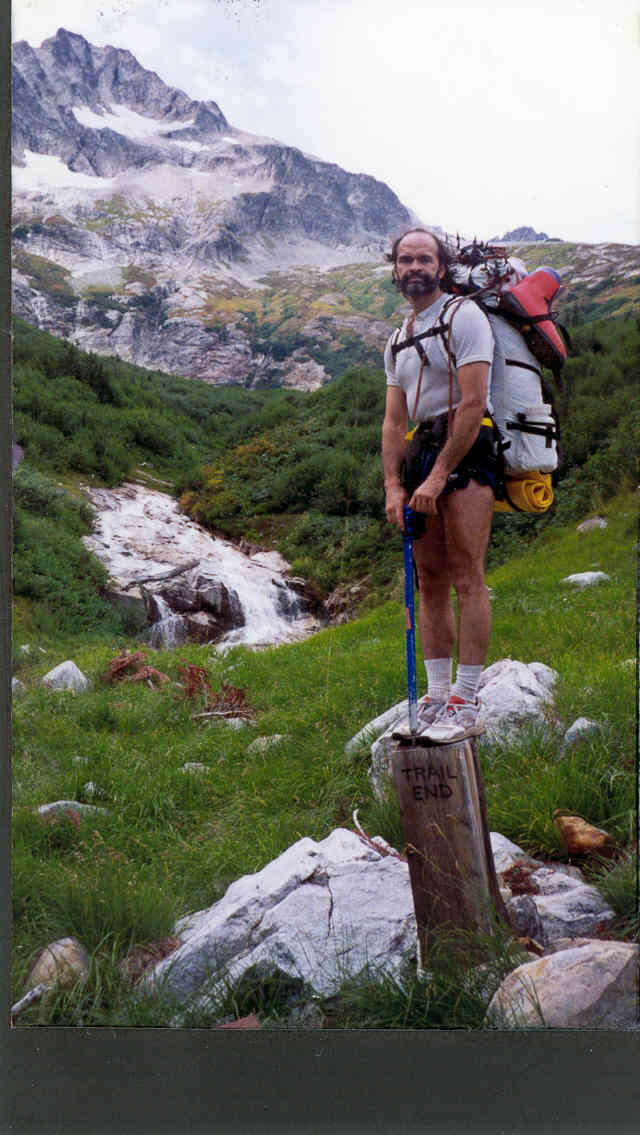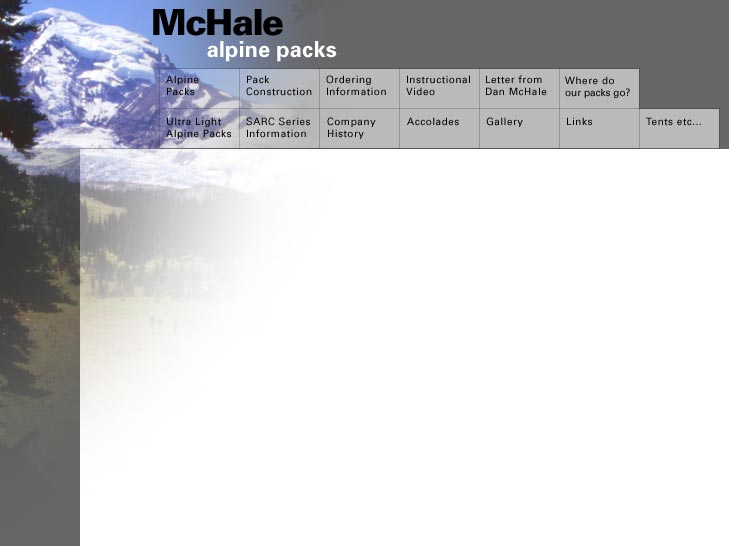| |
 Certain things in this letter are now
outdated - it is here for some historical perspective. Out of date like these
binoculars
Certain things in this letter are now
outdated - it is here for some historical perspective. Out of date like these
binoculars

Thank you for the inquiry into our pack line. McHale & Company is a very different
pack company 25 years in the making. The packs have quite a reputation for not
falling apart. They also have quite a reputation for doing exactly what we say
they can do. Our customers are generally amazed at our ability to outperform the
big companies. Sure, we don't outperform them in gross sales, catalog gloss, or
low prices, but in pack performance, in both durability and actual carrying performance,
no other company does it like we do.
How big isn't our company?
We sell about 200 packs each year, down from 500 since downsizing a few years
ago.. Half of these are sold mail order across the U.S., Canada and Europe and
the other half here at home in the Northwest. Since 1977 we've made approximately
7,000 packs. Those testimonials on the Internet are the tip of the iceberg. It's
a considerable output
when you consider each pack has been individually made to higher than industry
standards. If you ask around you'll probably find many people that would gladly
pay more now that they know how well they're made and how well they work. Many
of the pack sales represent repeat customers. Who buys McHale Packs? It's
natural that most people will buy a pack from a higher profile company first.
Those catalogs are enticing and the reviews sound so wonderful. Who can gush like
a professional gear reviewer?! We wish life was so easy. The true test of a pack,
though, is whether the customer keeps it or not. The big safety net for our company
is that our packs are actually better and the word gets around. We completely
expect our business to be trickle down. At least half of our customers have already
owned one or more of the other top name brands like... , ..., .... Typically,
the big brand names are over rated and over hyped. They have to be. It's very
natural for people to buy the packs that are the easiest to find also. Our customers
cover the spectrum from beginner to advanced and from first time pack buyer to
tenth time buyer. Many of them have come across from the external they had for
25 years, finally finding an internal with some guts. One thing they generally
have in common is that they're glad they found us. Backpacking and mountaineering
are grueling enough without having to put up with gear that is more image than
reality. How many packs are returned for repairs? Our rate of return for
defect repairs is zero. Although our packs have as full a guarantee as any on
the market, we like to emphasize 'they don't need no stinking guarantee!' Guarantees
do you absolutely no good in the mountains where things go bad. The only work
we ever do is repairing animal damage and replacing stolen packs. It is possible
to build fail-safe equipment that doesn't self-destruct even after many years
of serious use. A McHale pack will pay for itself over and over. output
when you consider each pack has been individually made to higher than industry
standards. If you ask around you'll probably find many people that would gladly
pay more now that they know how well they're made and how well they work. Many
of the pack sales represent repeat customers. Who buys McHale Packs? It's
natural that most people will buy a pack from a higher profile company first.
Those catalogs are enticing and the reviews sound so wonderful. Who can gush like
a professional gear reviewer?! We wish life was so easy. The true test of a pack,
though, is whether the customer keeps it or not. The big safety net for our company
is that our packs are actually better and the word gets around. We completely
expect our business to be trickle down. At least half of our customers have already
owned one or more of the other top name brands like... , ..., .... Typically,
the big brand names are over rated and over hyped. They have to be. It's very
natural for people to buy the packs that are the easiest to find also. Our customers
cover the spectrum from beginner to advanced and from first time pack buyer to
tenth time buyer. Many of them have come across from the external they had for
25 years, finally finding an internal with some guts. One thing they generally
have in common is that they're glad they found us. Backpacking and mountaineering
are grueling enough without having to put up with gear that is more image than
reality. How many packs are returned for repairs? Our rate of return for
defect repairs is zero. Although our packs have as full a guarantee as any on
the market, we like to emphasize 'they don't need no stinking guarantee!' Guarantees
do you absolutely no good in the mountains where things go bad. The only work
we ever do is repairing animal damage and replacing stolen packs. It is possible
to build fail-safe equipment that doesn't self-destruct even after many years
of serious use. A McHale pack will pay for itself over and over.
How
do you purchase a McHale Pack? Simply fill out the information on the fitting
form and give us a call. Most people have questions and we enjoy answering them.
Taking time to talk with customers is part of our business. Our roots go way back
so it can even be fun. Choosing a pack is not as difficult as choosing a Telemark
ski! Ask us anything. Remember: nothing ventured nothing gained. We don't do
rush orders. Just plan on using your old pack one or two times while waiting
for your wonderful new pack. Get your order in early because we eliminate some
models during summer to keep up with the most popular ones. We sometimes eliminate
a few colors in summer also. Finally, There is no risk buying a pack from us.
It's probably not possible to have a higher customer satisfaction factor than
we do. We guarantee that if you don't love what you get in the box you can send
it right back. We also guarantee you'll be raving to your friends about your new
pack.
Why
are McHale Packs better? When you look over the enclosed information you will
find many unique practical features not found anywhere else. The Alpineer Series
and SARC Series packs are packs 24 years in the making. It shows. The Critical
Mass frame is the only one on the market that does not directly impact
the pelvis. This, believe it or not, makes the lumbar pad optional! This
means we have a more integrated system that needs no extra technology or weight
to protect you from the pack. The newest packs are even designed to use a Thermarest
pad in place of our stock internal lumbar pad saving you $10 and 4 oz. McHale
Packs can carry more weight per ounce of pack weight than commercial packs. Our
commitment to stock 7 different dimensions of 7075-T6 aluminum for the different
models and to accommodate different body types is just the beginning of why our
packs are better. What about double buckles on hip belts? Now wait a minute! The
full wrap nature of our Alpineer hip belts is probably what our customers comment
on the most. It's by far the most secure belt on the market.
Another
very important feature of our packs is the BYPASS SHOULDER
HARNESS (see Sarc information pages in menu bar). It's the way the
lift-strap harness system should have been designed over 30 years ago when someone
decided to sew a stabilizer strap to the top of a shoulder pad. The conventional
lift-strap system is not user friendly, especially when you consider the majority
of people that own them do not use them properly, even with instruction. A symptom
of this is shoulder pads that are jammed high against the upper stabilizer buckle.
Working with people directly provides important feedback we use to improve and
invent new systems. Familiarize yourself with the yellow colored Bypass information
sheet then ask your friends or anyone else about harness adjusting. This will
be revealing. You'll discover your level of knowledge isn't as far behind the next person's as you thought!
Then, start bending the metal in all those internal frames. You might be amazed
at just how little they can take. Pull the stays from your friends twin stay packs
and see if the shapes match. Is the advantage to single stay packs for manufacturers?
You can't tell when the frame is misshaped because there's nothing to compare
it to. These are just some of the reasons many people have kept their old external
packs. In many cases the Internal Frame Revolution has not been much of a revolution.
Did you know 7075-T6 aluminum is used in every serious sporting goods product
except backpacks? McHale Packs is the only company to use it exclusively and has
7 times the number of different dimensions of it than the nearest competitor.
The best ski poles, tent poles, and climbing gear incorporate this amazing metal
that is also used in the structures of Boeing planes. Our popular Bayonet system
would not even be possible with conventional metals like 6061-T6 or 2024-T4 aluminum
that is used in all the other brands. What is more important - pack cost or pack
performance? From our point of view packs are machines that interact with the
body in a complex way. The job of a machine is to make work easier than it might
have otherwise been. First and foremost on our list of priorities is packs must
keep their intended designed shape. It is a joke that the industry standard metal
for internal-frame packs is 6061-T6.
your level of knowledge isn't as far behind the next person's as you thought!
Then, start bending the metal in all those internal frames. You might be amazed
at just how little they can take. Pull the stays from your friends twin stay packs
and see if the shapes match. Is the advantage to single stay packs for manufacturers?
You can't tell when the frame is misshaped because there's nothing to compare
it to. These are just some of the reasons many people have kept their old external
packs. In many cases the Internal Frame Revolution has not been much of a revolution.
Did you know 7075-T6 aluminum is used in every serious sporting goods product
except backpacks? McHale Packs is the only company to use it exclusively and has
7 times the number of different dimensions of it than the nearest competitor.
The best ski poles, tent poles, and climbing gear incorporate this amazing metal
that is also used in the structures of Boeing planes. Our popular Bayonet system
would not even be possible with conventional metals like 6061-T6 or 2024-T4 aluminum
that is used in all the other brands. What is more important - pack cost or pack
performance? From our point of view packs are machines that interact with the
body in a complex way. The job of a machine is to make work easier than it might
have otherwise been. First and foremost on our list of priorities is packs must
keep their intended designed shape. It is a joke that the industry standard metal
for internal-frame packs is 6061-T6.
The things we don't do are
every bit as important as those that we do. We don't build multiple layer laminated
belts that won't wrap around your hips. The current use of molded foam technology
has more to do with creating manufacturing efficiencies and way cool looks than
human comfort. Laminated materials are simply not alive and can feel rigid and
unforgiving against the human frame. The stiffeners in many hip belts create pressure
points they are meant to eliminate. We don't use plastic frame-sheets even though
they are, like lumbar pads, buzz components of the industry. From an engineering
standpoint plastic is simply no replacement for structural metal but hey, you
can cut it with scissors! The stockholders like that one - Hey, lets get rid of
the metal shop! We do use a minimum amount of HDPE in the back vents to distribute
frame tension. Our Bypass shoulder system is far more important than the overbuilt
compound-S monstrosities found on many packs. At first sight that sticky substance
they put on lumbar pads seems like a good idea too but, keep in mind, that if
the hip belt can't keep the pack up, then your pants or running shorts surely
won't. It's nonsense. We are happy to compete apart from the pack industry at
large. Bypass. Get it? Below:
Dan standing on the stump with a S-Sarc at the end of the trail on the way to
Mt Logan, North Cascades, Washington in 1995

| |

 output
when you consider each pack has been individually made to higher than industry
standards. If you ask around you'll probably find many people that would gladly
pay more now that they know how well they're made and how well they work. Many
of the pack sales represent repeat customers. Who buys McHale Packs? It's
natural that most people will buy a pack from a higher profile company first.
Those catalogs are enticing and the reviews sound so wonderful. Who can gush like
a professional gear reviewer?! We wish life was so easy. The true test of a pack,
though, is whether the customer keeps it or not. The big safety net for our company
is that our packs are actually better and the word gets around. We completely
expect our business to be trickle down. At least half of our customers have already
owned one or more of the other top name brands like... , ..., .... Typically,
the big brand names are over rated and over hyped. They have to be. It's very
natural for people to buy the packs that are the easiest to find also. Our customers
cover the spectrum from beginner to advanced and from first time pack buyer to
tenth time buyer. Many of them have come across from the external they had for
25 years, finally finding an internal with some guts. One thing they generally
have in common is that they're glad they found us. Backpacking and mountaineering
are grueling enough without having to put up with gear that is more image than
reality. How many packs are returned for repairs? Our rate of return for
defect repairs is zero. Although our packs have as full a guarantee as any on
the market, we like to emphasize 'they don't need no stinking guarantee!' Guarantees
do you absolutely no good in the mountains where things go bad. The only work
we ever do is repairing animal damage and replacing stolen packs. It is possible
to build fail-safe equipment that doesn't self-destruct even after many years
of serious use. A McHale pack will pay for itself over and over.
output
when you consider each pack has been individually made to higher than industry
standards. If you ask around you'll probably find many people that would gladly
pay more now that they know how well they're made and how well they work. Many
of the pack sales represent repeat customers. Who buys McHale Packs? It's
natural that most people will buy a pack from a higher profile company first.
Those catalogs are enticing and the reviews sound so wonderful. Who can gush like
a professional gear reviewer?! We wish life was so easy. The true test of a pack,
though, is whether the customer keeps it or not. The big safety net for our company
is that our packs are actually better and the word gets around. We completely
expect our business to be trickle down. At least half of our customers have already
owned one or more of the other top name brands like... , ..., .... Typically,
the big brand names are over rated and over hyped. They have to be. It's very
natural for people to buy the packs that are the easiest to find also. Our customers
cover the spectrum from beginner to advanced and from first time pack buyer to
tenth time buyer. Many of them have come across from the external they had for
25 years, finally finding an internal with some guts. One thing they generally
have in common is that they're glad they found us. Backpacking and mountaineering
are grueling enough without having to put up with gear that is more image than
reality. How many packs are returned for repairs? Our rate of return for
defect repairs is zero. Although our packs have as full a guarantee as any on
the market, we like to emphasize 'they don't need no stinking guarantee!' Guarantees
do you absolutely no good in the mountains where things go bad. The only work
we ever do is repairing animal damage and replacing stolen packs. It is possible
to build fail-safe equipment that doesn't self-destruct even after many years
of serious use. A McHale pack will pay for itself over and over.
 your level of knowledge isn't as far behind the next person's as you thought!
Then, start bending the metal in all those internal frames. You might be amazed
at just how little they can take. Pull the stays from your friends twin stay packs
and see if the shapes match. Is the advantage to single stay packs for manufacturers?
You can't tell when the frame is misshaped because there's nothing to compare
it to. These are just some of the reasons many people have kept their old external
packs. In many cases the Internal Frame Revolution has not been much of a revolution.
Did you know 7075-T6 aluminum is used in every serious sporting goods product
except backpacks? McHale Packs is the only company to use it exclusively and has
7 times the number of different dimensions of it than the nearest competitor.
The best ski poles, tent poles, and climbing gear incorporate this amazing metal
that is also used in the structures of Boeing planes. Our popular Bayonet system
would not even be possible with conventional metals like 6061-T6 or 2024-T4 aluminum
that is used in all the other brands. What is more important - pack cost or pack
performance? From our point of view packs are machines that interact with the
body in a complex way. The job of a machine is to make work easier than it might
have otherwise been. First and foremost on our list of priorities is packs must
keep their intended designed shape. It is a joke that the industry standard metal
for internal-frame packs is 6061-T6.
your level of knowledge isn't as far behind the next person's as you thought!
Then, start bending the metal in all those internal frames. You might be amazed
at just how little they can take. Pull the stays from your friends twin stay packs
and see if the shapes match. Is the advantage to single stay packs for manufacturers?
You can't tell when the frame is misshaped because there's nothing to compare
it to. These are just some of the reasons many people have kept their old external
packs. In many cases the Internal Frame Revolution has not been much of a revolution.
Did you know 7075-T6 aluminum is used in every serious sporting goods product
except backpacks? McHale Packs is the only company to use it exclusively and has
7 times the number of different dimensions of it than the nearest competitor.
The best ski poles, tent poles, and climbing gear incorporate this amazing metal
that is also used in the structures of Boeing planes. Our popular Bayonet system
would not even be possible with conventional metals like 6061-T6 or 2024-T4 aluminum
that is used in all the other brands. What is more important - pack cost or pack
performance? From our point of view packs are machines that interact with the
body in a complex way. The job of a machine is to make work easier than it might
have otherwise been. First and foremost on our list of priorities is packs must
keep their intended designed shape. It is a joke that the industry standard metal
for internal-frame packs is 6061-T6.

